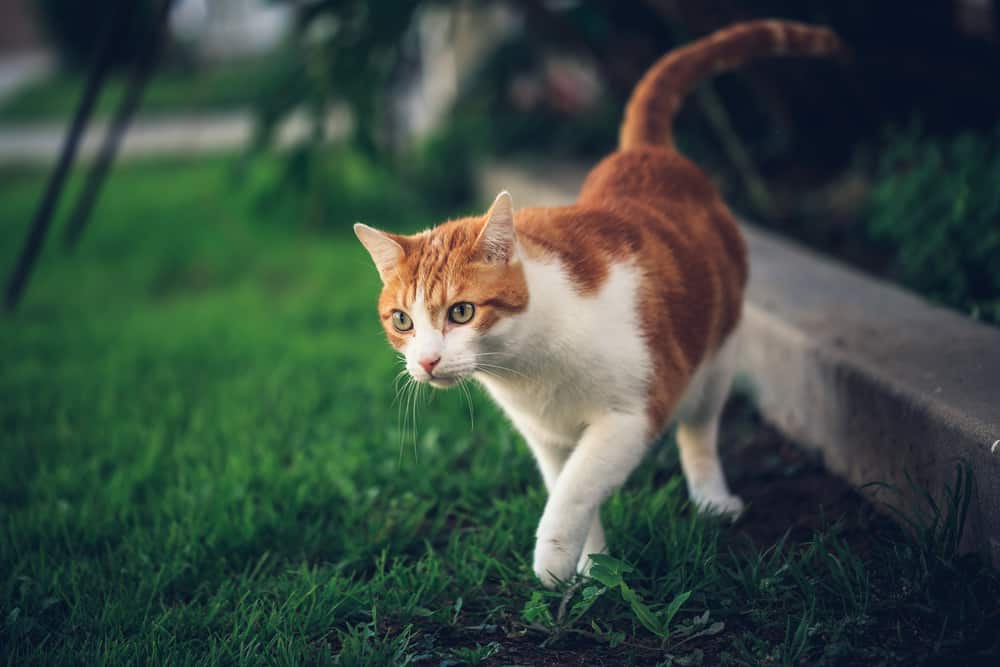Natural and Safe Cat Repellents

Whether you are a fan of felines or abhor the nighttime noise of your neighborhood tomcats, you likely want to preserve your peace by keeping cats out of areas where they don’t belong. Thankfully, it turns out there are at least a dozen proven natural ways to deter cats from your garden, and it does not take a great re-planting project to get started.
Well over half of the U.S. population owns at least one pet. While dogs are most popular, cats are also very widespread. So, even if you don’t own a cat yourself, your neighbor might. Unwelcome visits messing up your lawn can severely strain neighborly relations.
And if you are a cat owner yourself, you may be looking for harmless ways to manage their natural behavior better. As much as you love your kitty, it is unpleasant to see cats walk over the kitchen bench or find tufts of fur on the furniture heirlooms.
Natural cat repellents that you can use range from physical barriers and water, to strong scents and sounds. Your situation will dictate which methods you should try first, so I have laid out a range of traditionally proven techniques for you to choose from. Depending on where cats gain access to restricted areas, and what they do when they get there, you can find a non-toxic remedy that will not harm the kitty.
- Why Should I Keep Cats Out of My Yard?
- How Can I Safely Repel a Cat?
- Keeping Cats off Furniture
- Containing Cats With Fencing
- Surfaces That Cats Won’t Walk On
- Placing Chicken Wire on the Ground
- Essential Oil Cat Repellents
- DIY Citrus Peel Cat Repellent
- Vinegar to the Rescue
- Other Natural Repellent Sprays
- Repelling Cats With Cinnamon
- Planting Natural Cat Repellents
- A Surprise Spray
- Cat Aversion Training
- Not All Cat Repellents Are Harmless
- Keeping Cats Away
Why Should I Keep Cats Out of My Yard?
Cats are beautiful animals, even if you are not a cat lover, but stray cats or even the neighbor’s pet jumping the fence can be an unpleasant nuisance behavior.
Finding little presents in the yard where your children are playing is not nice. To have cats use your freshly sown flower bed as litter box is also unwelcome, not to mention the feline territorial behavior of spraying urine. Cats can also be a threat to birds, and it is estimated that in the U.S. alone cats kill 140 million songbirds and small animals annually.
If they get inside, you are likely to encounter fur on seating or where the cats rub themselves on your furniture. If you have someone in the house with allergic reactions, then taking resolute action is certainly called for.
Want another reason to keep cats out? As carnivores, the feces of cats may contain pathogens and parasites. You don’t want that in your homegrown vegetables.
Fortunately, there are natural ways to deter cats from your yard and avoid undesirable damage.
How Can I Safely Repel a Cat?
First off, you should observe the cat’s behavior to determine where your efforts will be best spent. If it will be the same cat visiting every night, try to learn its routine. Where does it climb the fence or slip through an opening? What part of your property does the tabby frequent? Is there a favorite spot where it often lies?
Cats are delicate animals and averse to unpleasant surfaces, certain sounds, and strong odors. The feline hunters have sensitive feet and sharp ears, and a cat’s sense of smell is 40 times more sensitive than yours. You can take advantage of these characteristics.
With the right knowledge about natural cat deterrents, along with observations of their usual behavior, there are several ways to repel unwanted cats.
Keeping Cats off Furniture

Inside your home, cats may jump onto furniture or countertops where they are unwanted. A simple solution is to intercept them with some aluminum foil or even sandpaper.
Cats have sensitive footpads, and you will find these obstacles will very quickly deter the animals from their habitual routes. You may even find that the foil or paper very soon are no longer needed, and you can remove them again. After a few unpleasant surprises, the animal will have learned to avoid those places.
As an alternative to aluminum foil you could use double-sided sticky tape instead. The tape will not actually trap the cat, but the brief discomfort it will cause will surely teach the cat not to come back that way again.
Containing Cats With Fencing
Outside you can take more drastic measures to keep stray cats out. A mildly mischievous but very effective strategy can be to oil the top of a wood or vinyl fence. You can also do that with wire fences, making it very difficult for the cat to balance on top.
If, on the other hand, you want to keep your own cats from straying outside a contained area, or onto the neighbor’s property, you can go as far as building a fence at least 6 feet high. If you build it with an overhang, then cats will not be able to jump over the fence.
Surfaces That Cats Won’t Walk On
If the cat does get through the fence, your next line of defense could be to create a rough border area with material like gravel, pinecones, or needles. Cats really dislike walking on sharp and uneven textures and would rather head off in another direction, hopefully back to where they came from.
The layout of your yard will determine your best options. Covering a footpath in sharp gravel may work for you, or placing prickly mulch around flowers you want to protect can do the trick.
Placing Chicken Wire on the Ground
If these methods will not stop cats from invading your yard, then a chicken wire mesh laid on the ground likely will. Cats will not voluntarily walk across such an uneven surface. A thin strip of wire, just thick enough that the cat can’t leap over it, can create a boundary without causing much obstruction to the regular use of your yard.
Essential Oil Cat Repellents
The cat repellent odor of some plants can be found condensed in certain essential oils, especially from citrus plants. Look for orange, citronella, or lemongrass to spray in strategic places where cats traverse. Be sure to thoroughly research any essential oils before you use them—the above bother cats sensitive noses but aren’t toxic, making them safe yet effective, but some might be more harmful.
Mix one part oil with three parts water in a spray bottle. Shake well, and you are all set to go.
Another way to use essential oils as natural cat repellent is to soak cotton balls and place them in strategic locations. You just need to check regularly and refresh the cotton balls if they dry out.
As a bonus, you may not only have a pleasant smell lingering around your house, but also ward off troublesome insects.
DIY Citrus Peel Cat Repellent

You can achieve a similar effect as that of essential oils by using citrus peels as natural cat repellent.
A simple recipe for a citrus peel repellent is adding one cup of orange peel to two cups of water. Boil the liquid for 10 minutes then let it cool down for half an hour. Add 1 or 2 teaspoons of lemon juice to strengthen the scent. Lastly, add a good squirt of dish soap and shake well. Alternatively, try other citrus peels, like oranges, lemon, lime, or tangerine, although your cats may react differently to any of these.
This natural cat repellent can be applied to all areas where cats are unwelcome. The odor will remain after the water evaporates, and is normally sufficient to deter cats and turn them away.
When the odor dissipates, it is time to reapply more of this natural cat repellent. Simply keep the citrus peel spray in easy reach to maintain this deterrent effect.
Vinegar to the Rescue
You can also make your own vinegar cat repellent to apply to areas where cats lie down or cause mischief. The stringent smell can be a very effective way to manage nuisance behavior.
Just pour vinegar and water in equal parts into a spray bottle. Add a squirt of dish soap and give it a good shake for half a minute. You can now apply it indoors and outdoors, wherever you don’t want cats to frequent.
Other Natural Repellent Sprays
There are many other homemade cat deterrent sprays that are overpowering for a feline’s sensory organs and will discourage them from entering or traversing treated areas. Apart from citrus, you can try garlic, black pepper or even cayenne pepper.
Alternatively, to make it even easier for you, try mixing fresh citrus juice that you can buy readymade from a store with equal parts of water. Spray this liquid on windowsills, outdoor furniture, or along pathways where cats wander. Just be sure to avoid the kind of sugary juices that create tacky surfaces where someone is likely to walk or touch, though.
Repelling Cats With Cinnamon
Still in the category of natural odors that cats find repelling, cinnamon should also be in your toolbox – or your pantry at least. Just sprinkle some into passages or spaces used by your neighbor’s cat to enter your property and you will find that the cat will turn back again.
Planting Natural Cat Repellents
You can create a natural cat repellent for the yard by planting plants that bother cats like rue or lavender. Another well-known flower that deters cats is Coleus canina, or the aptly named Scaredy Cat plant. Planting a garden is a longer-term approach, but it may be a more attractive investment in your peaceful coexistence with stray cats.
A Surprise Spray
Another harmless but effective way to deter cats is water. Cats very much dislike getting wet. So, if you can get hold of a motion-activated water sprinkler, the intruders will very quickly learn to stay away.
For best effect, watch the cat walk around your yard to learn how it approaches the restricted area, and place the sprinkler strategically in its path. Even if the water spray is triggered by a bird, it is good to know that no harm will be done.
Scary Noises
Certain chimes or even artificial sounds generate an unpleasant background noise that can keep flighty cats away. Fortunately, what may be unpleasant noise to cats can still be pleasant sounds or imperceptible noise to human ears.
Even hanging a windchime can help—some cats will not like the unusual noise and stay away. You may discover that even the clattering of a couple of old pots hanging off a tree branch in the back of the yard will surprise and scare away unsuspecting kitties.
Ultrasonic Repellent
An ultrasonic device can reduce incursions into your and will make cats that do brave the barrier leave more quickly. It is not only mosquitos that are sensitive to frequencies the human ear cannot hear, but these high-frequency noises bother cats too (without being harmful).
If you go online, you will be able to find a range of products that have been shown to keep cats away with ultrasonic sounds.
Cat Aversion Training

Cats are too smart and agile to keep out of somewhere they want to be without trouble. Natural deterrents can certainly help keep cats away, but let’s face it – sooner or later, the cat may find an alternative route to the food source or resting area it really prefers. You will need to teach these cats that they are not welcome.
Our feline friends are intelligent learners, so cat aversion training takes advantage of this by teaching the cat what’s better for them and for you. Just keep in mind that you are not herding cattle but training a stealthy hunter. This will help you understand how best to use the arrangement of your house and the lay of your garden to ‘teach’ these cats not be a nuisance.
Not All Cat Repellents Are Harmless
Some natural deterrents are more harmful than they may appear. Many household cleansers have smells that you may think could serve as a deterrent. However, the caustic chemicals often used are poisonous to cats, birds, and other animals.
Be careful with using pepper, especially strong varieties like cayenne, because they can potentially make cats sick, and never resort to mothballs outside your wardrobe as they are highly toxic – for cat, dogs and even children.
If you’re ever in doubt about if something is safe, don’t use it.
Keeping Cats Away
As you can see, you can use odor, sound, water, and mechanical devices as natural cat deterrents. If you have free-roaming cats invading your yard, you should now know everything you need to know about natural cat repellents which you can use to reclaim your peace.
Who would have guessed that cinnamon could help keep the peace with your neighbors?




